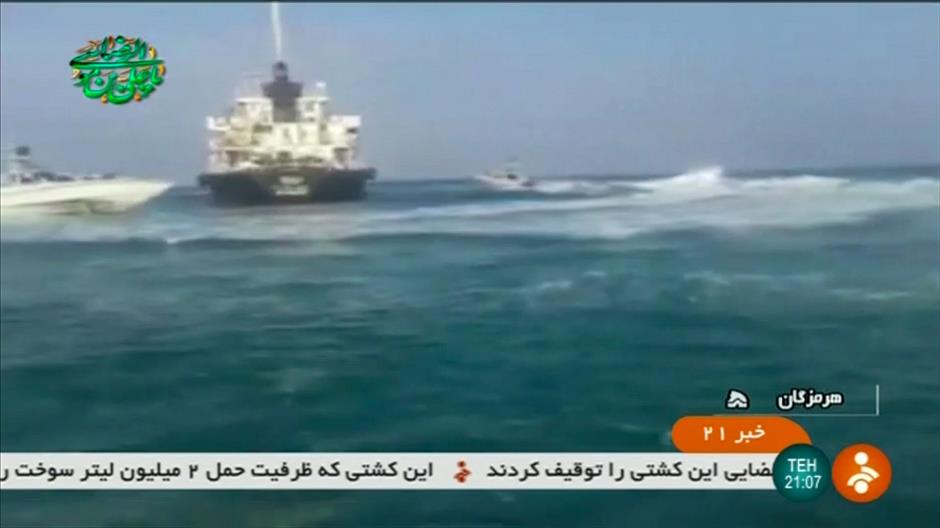Iran forces seize foreign oil tanker

An image grab taken from a video released by the Iranian Revolutionary Guards on July 18, 2019, reportedly shows the Panamanian-flagged tanker Riah, that was detained by Iran's Revolutionary Guards.
Iran's paramilitary Revolutionary Guard forces have seized a foreign oil tanker accused of smuggling oil, Iran’s state TV reported yesterday.
The vessel appears to be a United Arab Emirates-based tanker that had disappeared off trackers in Iranian territorial waters over the weekend.
The seizure was the latest in a series of dramatic developments as tensions mount between the United States and Iran over the unravelling nuclear deal between Tehran and world powers.
The Panamanian-flagged oil tanker MT Riah stopped transmitting its location early on Sunday near Qeshm Island, which has a Revolutionary Guard base on it, according to data listed on tracking site Maritime Traffic.
Iran’s state television did not identify the seized vessel or nationalities of the crew, but said it was intercepted on Sunday. It said the oil tanker had 12 foreign crew members on board and was involved in smuggling some 1 million liters of fuel from Iranian smugglers to foreign customers.
The report said the oil tanker was intercepted south of Iran’s Larak Island in the Strait of Hormuz. Larak is a smaller island just southeast of the larger Qeshm Island.
Crude prices, which had been falling since last week, ticked higher almost immediately after reports of the incident.
The seizure of the ship does not immediately appear to directly target any one particular country and shows the Revolutionary Guard cracking down on illegal smuggling of Iranian oil.
The 58-meter Riah typically made trips from Dubai and Sharjah on the UAE’s west coast before going through the strait and heading to Fujairah on the UAE’s east coast.
The UAE has been calling for a de-escalation of tensions between the US and Iran in past weeks, but has also lobbied for tougher US policies on Iran and supports the maximum pressure campaign of sanctions imposed by the Trump administration since the US unilaterally pulled out of Iran’s nuclear deal with world powers.
The ship’s seizure comes after a tense, but brief standoff last week between the British navy and Iran’s Revolutionary Guard in the Strait of Hormuz, the narrow mouth of the Persian Gulf through which a fifth of all crude oil passes.
The British government said a navy frigate had to warn away the paramilitary vessels from disrupting the passage of a British oil tanker through the strait.
It also comes after British marines helped seize an Iranian supertanker off Gibraltar.
Britain has since said it would facilitate the release of the tanker if Iran can provide guarantees the vessel would not breach European Union sanctions on shipments to Syria.
Iran has recently increased uranium production and enrichment over the limits of its 2015 nuclear deal, trying to put more pressure on Europe to offer it better terms and allow it to sell its crude oil abroad.
The US has sent thousands of additional troops, B-52 bombers and advanced fighter jets to the region amid the heightened tensions. Iran also shot down a US surveillance drone, raising fears of a wider conflict.
In May, two Emirati oil tankers were among four tankers attacked in acts of sabotage that the US has blamed on Iran. The UAE has stopped short of blaming any country for the attacks off its coast of Fujairah and maintains that diplomacy is the way forward.
Last month saw two other attacks on oil vessels. Iran denies involvement in any of the vessel attacks.















